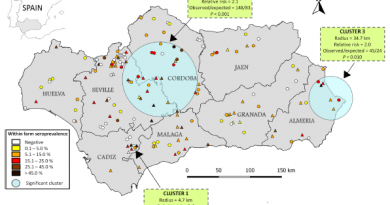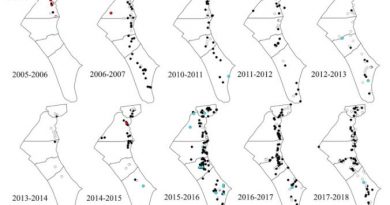Monitoring the epidemic of West Nile virus in equids in Spain, 2020–2021
Preventive Veterinary Medicine
Abstract
The largest epidemic of West Nile virus (WNV) reported ever in Spain in both humans and equines occurred in 2020, affecting 77 humans and 139 equine herds. Here, we aimed to monitor the outbreaks detected in equid herds in Andalusia (southern Spain), the Spanish region where 89.9% of the outbreaks were reported, and to evaluate the virus circulation and risk factor associated with WNV exposure in the affected herds. The first WNV case was detected in mid-July 2020, the number of outbreaks peaked in mid-August and the last one was confirmed on 26th October 2020. WNV lineage 1 was detected in 12 clinically affected horses using real time RT-PCR. Molecular analysis evidenced high nucleotide identity with WNV sequences obtained from humans, birds and mosquitoes from Spain and Italy between 2020 and 2022. Between five and eight months after the WNV epidemic, a total of 724 equids (including 485 unvaccinated and 239 vaccinated animals) from 113 of the 125 affected herds in Andalusia were sampled. IgM and IgG antibodies against WNV were detected in 1.6% (8/485; 95%IC: 0.0–2.5) and 61.9% (300/485; 95%IC: 58.3–65.5) of the unvaccinated individuals, respectively. The seropositivity in vaccinated horses was 86.6% (207/239). The main risk factors associated with WNV exposure in unvaccinated equids were the breed (crossbreed), the location of animals in spring-summer (outside), and the presence of natural water ponds close to the surveyed herds. The high individual seroprevalence obtained in the affected herds indicates that WNV circulation was more widespread than the reported by passive surveillance during the WNV epidemic in 2020. The re-emergence of WNV in 2020 in southern Spain evidenced the needed to improve integrated surveillance systems, minimizing the impact of future cases in equids and humans in high-risk areas.




